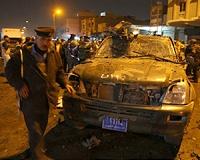| . |  |
. |
Baghdad (UPI) Jan 14, 2009 Prime Minister Nouri al-Maliki, his re-election prospects seriously damaged by a wave of suicide bombings in Baghdad that killed 400 people, is fighting for political survival. There is talk of a coup in the air, reflecting the deep sense of foreboding that pervades Baghdad amid rising violence, a frenzy of political intrigue and mounting Iranian interference in the run-up to the parliamentary elections slated for March 7. Maliki, under fire particularly from his own constituency among the Shiite majority, is striking out in all directions as he scrambles to stay in a political race that shows every sign of degenerating into sectarian bloodshed. Last week he banned at least 15 political parties from contesting the elections, which will effectively determine whether the Americans leave behind a democratic, unified state or a land plunged into civil war. The events of the next few weeks will also determine whether U.S. President Barack Obama feels confident enough to continue with the gradual withdrawal of U.S. combat forces that began last June. All the parties blacklisted by Maliki were either from the Sunni minority or were connected to it. The prime minister has blamed the suicide bombings on remnants of the outlawed Baath Party, the political instrument through which Saddam Hussein ruled Iraq for nearly three decades until his downfall in April 2003. That has, at a stroke, shattered any expectation of a reconciliation between the minority Sunnis, who were the backbone of Saddam's regime, and the Shiites, who were brutally repressed by that tyranny. In the last three years, under U.S. tutelage, the Sunnis were persuaded, largely through large amounts of money and promises of immunity from prosecution, to abandon the insurgency they had led since the U.S.-led invasion. Maliki has prevented tens of thousands of these former insurgents from being absorbed into Iraq's postwar security forces or the civil service, even though the U.S. pledge of political inclusion played a key role in convincing the Sunni fighters to change sides. Sunni antagonism was heightened Thursday when a Baghdad court sentenced to death 11 men -- all Sunnis -- for involvement in the first wave of suicide bombings in the capital on Aug. 19 in which more than 100 people were slaughtered. Maliki has ordered a major security operation to prevent further bombings, with hundreds of arrests reported. His forces claimed Tuesday they had seized a cache of 800 pounds of explosives and prevented a new wave of bombings against government ministries in the capital. The veracity of that claim is difficult to determine. Baghdad was locked down for a time, raising fears of a coup plot. The government denied there was one. The coup fears may have been exaggerated, but they were not fanciful, since even some Shiites have been increasingly critical of Maliki in recent days as the situation deteriorates. Last week former British Ambassador to Baghdad John Jenkins testified before a London inquiry investigating Britain's involvement in the invasion that a coup in Iraq now is "a real possibility." It seems evident that Iran's Shiite allies are involved in -- if not behind -- the move to sideline key Sunni leaders and their followers in the election. This is a dangerous course to take, even without the current upheavals and uncertainty. The last time Tehran sought to marginalize Sunnis with a Baathist past was in the run-up to the 2005 elections. That resulted in most Sunnis boycotting the polls and turning to the insurgency. Maliki, whose State of Law coalition is facing severe problems, has been reported to be seeking an alliance after the election with the Iranian-backed Iraqi National Coalition, a Shiite bloc, to form a new ruling coalition. U.S. security consultancy Stratfor said that was the result of "Iranian arm-twisting" so that Tehran can dominate the next Iraqi government and exert long-term influence over Iraqi affairs. Maliki, a Shiite who was given sanctuary in Iran during Saddam's rule, is well aware he needs to maintain relations with Tehran. But as an Iraqi nationalist he prefers to keep it at arm's length. However, he may be realizing that under the circumstances, increasingly assailed from all sides of Iraq's body politic, he has little choice but to make some sort of arrangement with Iran if he wants to win in March. He "now appears to be falling in line with Tehran's wishes," according to Stratfor.
Share This Article With Planet Earth
Related Links Iraq: The first technology war of the 21st century
 Bombs kill up to 15 in Shiite holy city in Iraq
Bombs kill up to 15 in Shiite holy city in IraqNajaf, Iraq (AFP) Jan 14, 2010 As many as 15 people were killed and dozens more were wounded on Thursday when three bombs exploded simultaneously in a rare attack in the Shiite Muslim shrine city of Najaf, officials said. A car bomb was detonated near a mosque and two other bombs blew up in a retail market as darkness fell in the city, 150 kilometres (90 miles) south of Baghdad, according to a security official. Accounts of the number of casualties varied, but an interior ministry official in the capital said 15 people were killed and 25 wounded. ... read more |
|
| The content herein, unless otherwise known to be public domain, are Copyright 1995-2009 - SpaceDaily. AFP and UPI Wire Stories are copyright Agence France-Presse and United Press International. ESA Portal Reports are copyright European Space Agency. All NASA sourced material is public domain. Additional copyrights may apply in whole or part to other bona fide parties. Advertising does not imply endorsement,agreement or approval of any opinions, statements or information provided by SpaceDaily on any Web page published or hosted by SpaceDaily. Privacy Statement |